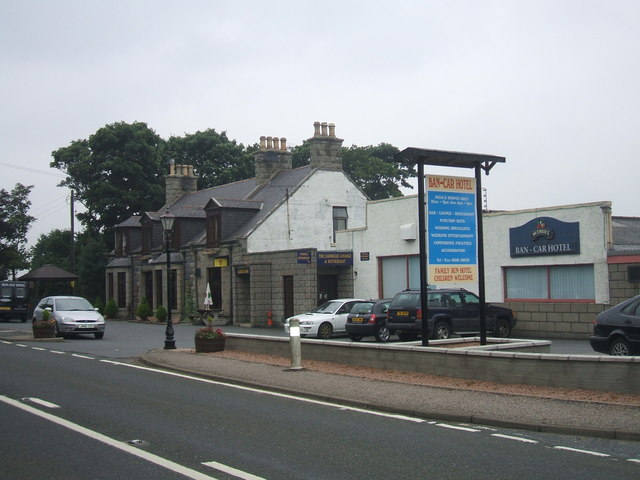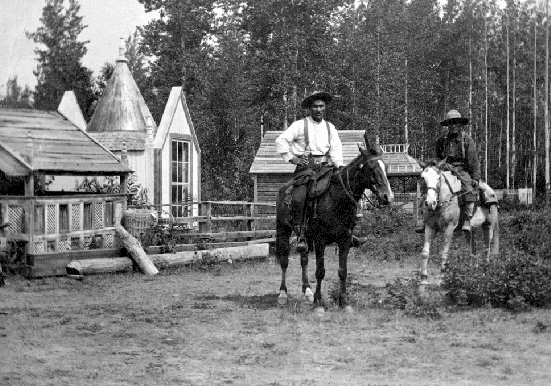|
Stuart Alexander Henderson
Stuart Alexander Henderson (September 19, 1863 – February 17, 1945) was a Scottish-born lawyer and political figure in British Columbia. He represented Yale from 1903 to 1909 in the Legislative Assembly of British Columbia as a Liberal. Henderson was celebrated as the greatest Canadian criminal lawyer of his time. Life and career He was born in Lonmay, Aberdeenshire, the son of William Henderson and Mary Jane Smith. He came to Ontario with his father in 1872 and was educated in Ottawa, at Toronto University and at Osgoode Hall. While in Ontario, he served as a lieutenant in the militia. Henderson was also an Ottawa alderman. He came to British Columbia in 1897 and entered the practice of law there the following year. Henderson was married twice: first to Alice London in 1890 and then to Mary Jane Losh in 1904. He was a director for the Mutual Life Company of Canada. He was defeated when he ran for reelection to the assembly in 1909 and again in Lillooet in 1912. ... [...More Info...] [...Related Items...] OR: [Wikipedia] [Google] [Baidu] |
Lonmay
Lonmay (Scottish Gaelic: ''Lòn Magh'') is a village and parish in the Buchan area of Aberdeenshire, Scotland. It lies along the A90 road, between Peterhead and Fraserburgh, near to the junction with the A952 road at Cortes. The parish, formerly known as St Colms, encompasses the villages of St Combs (to which it lent its name) and Crimond, as well as the village of Lonmay. It had a station on the Formartine and Buchan Railway, but this closed in 1965. The present Lonmay Kirk dates from 1786. Lonmay is largely agricultural and has several historic properties, notably Cairness House. Lonmay is said to be the home of the ancestors of Elvis Presley Elvis Aaron Presley (January 8, 1935 – August 16, 1977), or simply Elvis, was an American singer and actor. Dubbed the "Honorific nicknames in popular music, King of Rock and Roll", he is regarded as Cultural impact of Elvis Presley, one .... References Villages in Aberdeenshire {{Aberdeenshire-geo-stub ... [...More Info...] [...Related Items...] OR: [Wikipedia] [Google] [Baidu] |
Ontario
Ontario ( ; ) is one of the thirteen provinces and territories of Canada.Ontario is located in the geographic eastern half of Canada, but it has historically and politically been considered to be part of Central Canada. Located in Central Canada, it is Canada's most populous province, with 38.3 percent of the country's population, and is the second-largest province by total area (after Quebec). Ontario is Canada's fourth-largest jurisdiction in total area when the territories of the Northwest Territories and Nunavut are included. It is home to the nation's capital city, Ottawa, and the nation's most populous city, Toronto, which is Ontario's provincial capital. Ontario is bordered by the province of Manitoba to the west, Hudson Bay and James Bay to the north, and Quebec to the east and northeast, and to the south by the U.S. states of (from west to east) Minnesota, Michigan, Ohio, Pennsylvania, and New York. Almost all of Ontario's border with the United States f ... [...More Info...] [...Related Items...] OR: [Wikipedia] [Google] [Baidu] |
Osgoode Hall Law School Alumni
*Osgoode Hall, building in Toronto, Canada *Osgoode Hall Law School *Osgoode Station, rapid transit station in Toronto *Osgoode, Ontario *Osgoode Township, Ontario, ward in Ottawa *William Osgoode, first Chief Justice of Upper Canada The Province of Upper Canada (french: link=no, province du Haut-Canada) was a part of British Canada established in 1791 by the Kingdom of Great Britain, to govern the central third of the lands in British North America, formerly part of the ... See also * Osgood (other) {{disambig ... [...More Info...] [...Related Items...] OR: [Wikipedia] [Google] [Baidu] |
University Of Toronto Alumni
A university () is an institution of higher (or tertiary) education and research which awards academic degrees in several academic disciplines. Universities typically offer both undergraduate and postgraduate programs. In the United States, the designation is reserved for colleges that have a graduate school. The word ''university'' is derived from the Latin ''universitas magistrorum et scholarium'', which roughly means "community of teachers and scholars". The first universities were created in Europe by Catholic Church monks. The University of Bologna (''Università di Bologna''), founded in 1088, is the first university in the sense of: *Being a high degree-awarding institute. *Having independence from the ecclesiastic schools, although conducted by both clergy and non-clergy. *Using the word ''universitas'' (which was coined at its foundation). *Issuing secular and non-secular degrees: grammar, rhetoric, logic, theology, canon law, notarial law.Hunt Janin: "The university i ... [...More Info...] [...Related Items...] OR: [Wikipedia] [Google] [Baidu] |
Scottish Emigrants To Canada
Scottish usually refers to something of, from, or related to Scotland, including: *Scottish Gaelic, a Celtic Goidelic language of the Indo-European language family native to Scotland *Scottish English *Scottish national identity, the Scottish identity and common culture *Scottish people, a nation and ethnic group native to Scotland *Scots language, a West Germanic language spoken in lowland Scotland *Symphony No. 3 (Mendelssohn), a symphony by Felix Mendelssohn known as ''the Scottish'' See also *Scotch (other) *Scotland (other) *Scots (other) *Scottian (other) *Schottische The schottische is a partnered country dance that apparently originated in Bohemia. It was popular in Victorian era ballrooms as a part of the Bohemian folk-dance craze and left its traces in folk music of countries such as Argentina ("chotis"Span ... * {{disambiguation Language and nationality disambiguation pages ca:Escocès ... [...More Info...] [...Related Items...] OR: [Wikipedia] [Google] [Baidu] |
British Columbia Liberal Party MLAs
British may refer to: Peoples, culture, and language * British people, nationals or natives of the United Kingdom, British Overseas Territories, and Crown Dependencies. ** Britishness, the British identity and common culture * British English, the English language as spoken and written in the United Kingdom or, more broadly, throughout the British Isles * Celtic Britons, an ancient ethno-linguistic group * Brittonic languages, a branch of the Insular Celtic language family (formerly called British) ** Common Brittonic, an ancient language Other uses *''Brit(ish)'', a 2018 memoir by Afua Hirsch *People or things associated with: ** Great Britain, an island ** United Kingdom, a sovereign state ** Kingdom of Great Britain (1707–1800) ** United Kingdom of Great Britain and Ireland (1801–1922) See also * Terminology of the British Isles * Alternative names for the British * English (other) * Britannic (other) * British Isles * Brit (other) * Briton (d ... [...More Info...] [...Related Items...] OR: [Wikipedia] [Google] [Baidu] |
1945 Deaths
1945 marked the end of World War II and the fall of Nazi Germany and the Empire of Japan. It is also the only year in which Nuclear weapon, nuclear weapons Atomic bombings of Hiroshima and Nagasaki, have been used in combat. Events Below, the events of World War II have the "WWII" prefix. January * January 1 – WWII: ** Nazi Germany, Germany begins Operation Bodenplatte, an attempt by the ''Luftwaffe'' to cripple Allies of World War II, Allied air forces in the Low Countries. ** Chenogne massacre: German prisoners are allegedly killed by American forces near the village of Chenogne, Belgium. * January 6 – WWII: A German offensive recaptures Esztergom, Kingdom of Hungary (1920–1946), Hungary from the Russians. * January 12 – WWII: The Soviet Union begins the Vistula–Oder Offensive in Eastern Europe, against the German Army (Wehrmacht), German Army. * January 13 – WWII: The Soviet Union begins the East Prussian Offensive, to eliminate German forces in East Pruss ... [...More Info...] [...Related Items...] OR: [Wikipedia] [Google] [Baidu] |
1863 Births
Events January–March * January 1 – Abraham Lincoln signs the Emancipation Proclamation during the third year of the American Civil War, making the abolition of slavery in the Confederate states an official war goal. It proclaims the freedom of 3.1 million of the nation's four million slaves and immediately frees 50,000 of them, with the rest freed as Union armies advance. * January 2 – Lucius Tar Painting Master Company (''Teerfarbenfabrik Meirter Lucius''), predecessor of Hoechst, as a worldwide chemical manufacturing brand, founded in a suburb of Frankfurt am Main, Germany. * January 4 – The New Apostolic Church, a Christian and chiliastic church, is established in Hamburg, Germany. * January 7 – In the Swiss canton of Ticino, the village of Bedretto is partly destroyed and 29 killed, by an avalanche. * January 8 ** The Yorkshire County Cricket Club is founded at the Adelphi Hotel, in Sheffield, England. ** American Civil War – ... [...More Info...] [...Related Items...] OR: [Wikipedia] [Google] [Baidu] |
The Canadian Encyclopedia
''The Canadian Encyclopedia'' (TCE; french: L'Encyclopédie canadienne) is the national encyclopedia of Canada, published online by the Toronto-based historical organization Historica Canada, with the support of Canadian Heritage. Available for free online in both English and French, ''The Canadian Encyclopedia'' includes more than 19,500 articles in both languages on numerous subjects including history, popular culture, events, people, places, politics, arts, First Nations, sports and science. The website also provides access to the ''Encyclopedia of Music in Canada'', the ''Canadian Encyclopedia Junior Edition'', ''Maclean's'' magazine articles, and ''Timelines of Canadian History''. , over 700,000 volumes of the print version of ''TCE'' have been sold and over 6 million people visit ''TCE'''s website yearly. History Background While attempts had been made to compile encyclopedic material on aspects of Canada, ''Canada: An Encyclopaedia of the Country'' (1898–1900), ... [...More Info...] [...Related Items...] OR: [Wikipedia] [Google] [Baidu] |
Simon Gunanoot
Simon Gunanoot (1874 – October 1933) was a prosperous Gitxsan man and a merchant in the Kispiox Valley region of Hazelton, British Columbia, Canada. He lived with his wife and children on a large ranch. A posse sought him after a murder but he escaped, retrieved his family and hid out. Eventually he surrendered and stood trial. He was found not guilty. The case garnered extensive media coverage and Gunanoot became a figure of legendary status. McIntosh/Leclair murder Gunanoot's brother-in-law, Peter Himadam, his wife and their children also lived at the ranch. One night, in June 1906, Gunanoot and Himadam were returning from Kitselas when they decided to stop in at the roadhouse at Two Mile, near Hazelton. There, Simon and Peter got into an argument with Hazelton dock worker Alec McIntosh and another man, packer and hunting guide Max Leclair. The argument led to physical blows and threats. Simon left, after commenting he was "going to get a gun and fix him". McIntosh also left ... [...More Info...] [...Related Items...] OR: [Wikipedia] [Google] [Baidu] |
Clarence Darrow
Clarence Seward Darrow (; April 18, 1857 – March 13, 1938) was an American lawyer who became famous in the early 20th century for his involvement in the Leopold and Loeb murder trial and the Scopes "Monkey" Trial. He was a leading member of the American Civil Liberties Union and a prominent advocate for Georgist economic reform. Called a "sophisticated country lawyer",Linder, Douglas O. (1997)"Who Is Clarence Darrow?", ''The Clarence Darrow Home Page'' Darrow's wit and eloquence made him one of the most prominent attorneys and civil libertarians in the nation. He defended high-profile clients in many famous trials of the early 20th century, including teenage thrill killers Leopold and Loeb for murdering 14-year-old Robert "Bobby" Franks (1924); teacher John T. Scopes in the Scopes "Monkey" Trial (1925), in which he opposed statesman and orator William Jennings Bryan; and Ossian Sweet in a racially charged self-defense case (1926). Early life Clarence Darrow was born in the ... [...More Info...] [...Related Items...] OR: [Wikipedia] [Google] [Baidu] |



